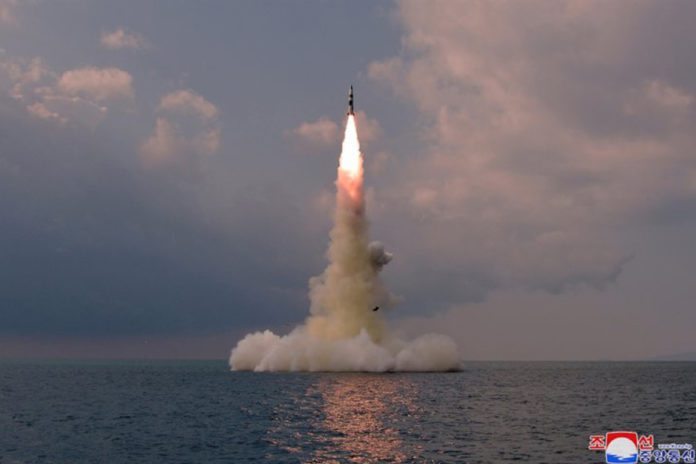SLBM test violated UN resolutions and was condemned by international community
Following North Korea’s successful test of a new submarine-launched ballistic missile (SLBM) on Tuesday, which is in violation of United Nations resolutions, the leftist South Korean government continued to argue that this is a sign that the two Koreas can talk again and an opportunity to offer sanctions relief. This drew strong backlash from the South Korean public, as the government is interpreting North Korea’s missile launches as a sign of communication, rather than a provocation.
Even though the South Korean government tried to downplay North Korea’s latest arms test, the international community strongly condemned the violation of the UN resolutions. Additionally, various experts, such as a former U.S. Forces Korea (USFK) chief, warned about a premature move to officially end the Korean War. The South Korean government is pushing for an end-of-war declaration, saying that it would not worsen the security threat posed by North Korea.
Chung Eui-yong, the South Korean Foreign Minister, told the National Assembly’s Foreign Affairs and Unification Committee on October 20 that sanctions relief can be considered if North Korea agrees to come to the negotiation table.
Thae Yong-ho, a former senior North Korean diplomat and current lawmaker from the main opposition People Power Party (PPP), asked Chung whether the Moon Jae-in administration still thinks that sanctions against North Korea should be lifted even though North Korea announced that it successfully conducted an SLBM test. “We need to take measures immediately to stop North Korea from developing its nuclear and missile capabilities further from now on,” Chung said. “Among many measures that we can take, I think lifting sanctions can be an option that we can thoroughly consider.”
When asked why the government did not categorize North Korea’s ballistic missile launch as a provocation, Chung said, “It is part of our effort to manage the Korean Peninsula issue more stably and help to resume talks between North Korea and the United States.”
Cho Tae-yong, former First Vice Minister of Foreign Affairs and a current lawmaker from the PPP, criticized Chung’s comment, saying that “the government has fallen for North Korea’s gaslighting strategy.”
Song Young-gil, the current head of the ruling Democratic Party, appeared on TV on October 20 and apparently defended North Korea once again. “Launching a short-range ballistic missile is a violation of the UN resolutions, but they are not testing any long-range missiles or nuclear weapons,” he said. “So I think it could have been worse [than the recent SLBM launch].” Song added that the need to hold talks with no preconditions has increased and that the government should manage this situation carefully to avoid it worsening.
A senior official from the presidential Blue House met with reporters on October 19 and said it expressed deep regrets about the missile launch. However, when asked whether the launch of the SLMB crossed a red line, the official said the government needs a more thorough review on the North’s intentions. A reporter asked the official, “Didn’t the inter-Korean talks rather make progress in 2017 after North Korea launched intercontinental ballistic missile?” The official responded, “We hope that interpretation is correct this time as well.”
Curtis Scaparrotti, who led USFK from 2013-2016, interpreted North Korea’s recent launch of the SLBM as a move from Pyongyang that demonstrated their wide range of capabilities. He added that its launch of an SLBM poses “another problem” to the U.S.-ROK alliance at a meeting hosted by the Korea-US Alliance Foundation and Korea Defense Veterans Association in Seoul on October 20.
“That is a problem with a country that is irresponsible with these missiles and the nuclear capability it has developed, and certainly it poses another problem to the alliance,” the former commander said. “A submarine-launched capability is another threat to the alliance and one that we have to make adjustments (for) and that we have to now consider in terms of the defense of the Republic of Korea.”
Gen. Scaparrotti argued that the “complex” issue of an end-of-war declaration should be discussed in a “careful” way and that the North Korean threat would not automatically disappear even if the Korean War ends. “We, sometimes, forget to go back and think about the threat that this alliance was formed to counter. That won’t change the day after the declaration of the end of the war,” he said. “It will still be present in the same way, in the same place most likely, and our responsibility as an alliance is to defend the Republic Korea and the people here.”
North Korea is banned from ballistic missile tests under United Nations Security Council resolutions. It has kept to a self-imposed moratorium on nuclear and long-range ballistic missile tests since late 2017, arguably in the spirit of diplomacy with the United States. It has conducted five weapons tests since this September, including of a hypersonic missile.
The UN released a statement on October 19 condemning North Korea’s missile launches and urged it to comply with the UN resolutions. “We are concerned about the latest reported launches from DPRK, including the report that the ballistic missile was launched from the sea,” it said. “At this point, we have repeatedly called on the DPRK leadership to fully comply.”
Observers are expecting continued harsh condemnation of the North’s missile from international actors like the UN, while South Korea looks set to continue appeasing Pyongyang and ignoring its newly-developed missile threats.



